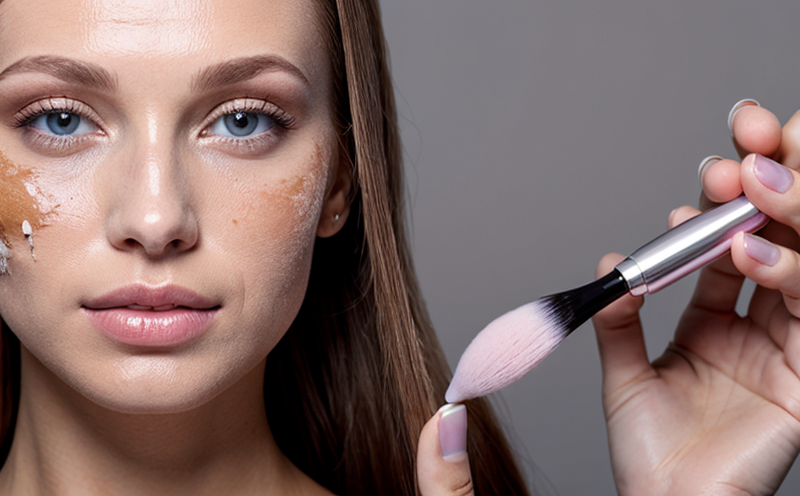Ethical Sourcing Verification Testing in Cosmetics
In today’s highly regulated and socially conscious market, ethical sourcing has become a crucial aspect of cosmetic manufacturing. The demand for transparency and sustainability is driving the need for rigorous testing to ensure that ingredients are responsibly sourced from suppliers who uphold high ethical standards. Ethical sourcing verification testing ensures that raw materials used in cosmetics meet not only regulatory requirements but also moral and environmental benchmarks.
The process involves several steps, including supplier audits, material traceability checks, and third-party certifications. By conducting these tests, manufacturers can ensure they are not inadvertently contributing to human rights abuses or environmental degradation. This is especially important given the global scrutiny of supply chains in recent years, which has led to increased pressure on companies to demonstrate their commitment to ethical practices.
The testing process typically involves examining documentation from suppliers and performing laboratory analyses on samples taken directly from production facilities. These analyses can include chemical composition checks, allergen screenings, and microbiological assessments. The goal is to verify that the ingredients are not only safe but also sourced in a manner consistent with international best practices.
International standards such as ISO 26000 provide guidelines on how companies should approach social responsibility, including ethical sourcing. By adhering to these standards, manufacturers can ensure their sourcing practices align with global expectations and regulations. For instance, the European Union’s REACH Regulation requires detailed documentation of a product’s entire supply chain, which is essential for ethical sourcing verification.
Testing also helps companies comply with the Non-GMO Project Standard, ensuring that no genetically modified organisms are present in their products. This is particularly important for consumers who have specific dietary restrictions or preferences. Additionally, tests can verify that ingredients meet vegan and cruelty-free standards, which are becoming increasingly popular among consumers.
The ethical sourcing verification testing process not only protects the brand’s reputation but also supports a more sustainable industry. By choosing suppliers with strong ethical practices, companies contribute to reducing deforestation, minimizing water usage, and promoting fair labor practices. This can lead to long-term cost savings by avoiding supply chain disruptions caused by unethical behavior.
Furthermore, ethical sourcing verification testing ensures that manufacturers remain compliant with evolving regulations worldwide. As new laws are enacted, such as the EU’s Green Deal or California’s Proposition 65, companies must adapt their practices accordingly. By conducting regular tests and audits, they can stay ahead of regulatory changes and avoid costly penalties.
In conclusion, ethical sourcing verification testing is essential for cosmetics manufacturers aiming to build a sustainable business model. It helps ensure that every step in the production process aligns with global standards for environmental responsibility, social justice, and consumer safety. By prioritizing this aspect of their operations, companies can foster trust among consumers and stakeholders while contributing positively to society.
Scope and Methodology
| Aspect | Description |
|---|---|
| Supplier Audits | Conducting comprehensive reviews of suppliers to ensure compliance with ethical sourcing practices. |
| Material Traceability Checks | Tracking the origin and movement of raw materials throughout the supply chain. |
| Third-Party Certifications | Verifying supplier credentials through independent third-party audits and certifications. |
| Laboratory Analyses | Performing chemical, allergen, microbiological, and other relevant tests on samples from production facilities. |
| Documentation Review | Evaluating supplier documentation to ensure transparency and compliance with regulations. |
| Test Parameters | Description |
|---|---|
| Allergen Screening | Detecting potential allergens in raw materials to ensure product safety. |
| Chemical Composition Checks | Verifying the chemical makeup of ingredients to confirm they meet specified standards. |
| Microbiological Assessments | Evaluating samples for microbial contamination to prevent health risks. |
| Non-GMO Verification | Confirming that no genetically modified organisms are present in the ingredients used. |
| Vegan and Cruelty-Free Certification | Ensuring that products contain only vegan-friendly, non-animal-derived ingredients. |
Why Choose This Test
- Ensures compliance with international standards and regulations.
- Promotes sustainable business practices that benefit the environment and society.
- Builds trust with consumers who value ethical and responsible sourcing.
- Avoids supply chain disruptions due to unethical supplier behavior.
- Supports long-term cost savings by maintaining a stable and reliable supply of raw materials.
Competitive Advantage and Market Impact
- Positions your brand as a leader in ethical and sustainable practices, appealing to socially conscious consumers.
- Differentiates your products from competitors who may not prioritize ethical sourcing.
- Increases market share by attracting new customers who value responsible business conduct.
- Enhances corporate reputation and public image, leading to increased brand loyalty.





